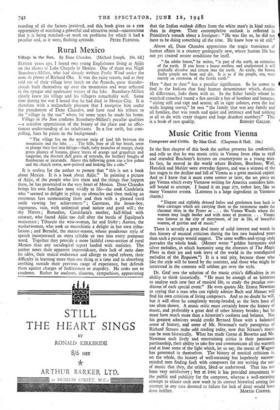Music Critic from Vienna .
Composer and Critic. By Max Graf. (Chapman & Hall. 16s.)
IN the first chapter of this book the author presents his credentials, and tells us that he was music critic in Vienna from 1890 to 1938 and attended Bruckner's lectures on counterpoint as a young man. In fact, he moved in the world where Brahms, Bruckner, Wolf, Hanslick and Mahler were everyday figures, and was a witness of the last stages'in the decline and fall of Vienna as a great musical capital. And so I knew that it must come sooner or later, the set piece on gay Vienna which every Viennese writing for America considers him- self bound to attempt. I found it on page 271, rather late, like so many Viennese events. (Lateness is a large ingredient in Viennese charm.)
" Elegant and stylishly dressed ladies and gentlemen lean back in their carriages which arc carrying them to the racecourse under the chestnut trees in the Prater or . . . the Vienna Woods where the women may laugh louder and with more of promise. . . . Vienna was famous as the city of merriment, of joy in life, of beautiful women, of gaieties and of music."
There is actually a great deal more of solid interest and worth in this history of musical criticism during the last two hundred years than such a passage would suggest. The same waffles-and-syrup style pervades the whole book. (Mozart wrote " golden harmonies and silver melodies, in which humanity sang the choruses of The Magic Flute in their joy and took leave of the world in the transfigured melodies of the Requiem.") It is a real pity, because those who like the style will be bored by the contents, and those who might be interested in the contents will seldom get over the style.
Dr. Graf sees the solution of the music critic's difficulties in an ability to think historically. "He must be enough of an historian to analyse each new fact of musical life, to study the peculiar con- ditions of each special event." He even quotes Mr. Ernest Newman as saying that a man who can rightly admire Bach and Mozart will find his own criticism of living composers. And so no doubt he will, 1 but it will often be completely wrong-headed, as the facts have all too often shown. A music Critic must certainly know the history of music, and preferably a great deal of other history besides ; but he must have much more than a historian's coolness and balance. Not his greatest admirers would credit Bernard Shaw with a balanced sense of history, and some of Mr. Newman's early panegyrics of Richard Strauss make odd reading today, now that Strauss's music can be seen historically. What has made Como di Bassetto and Mr. Newman such lively and entertaining critics is their passionate partisanship, their ability to take fire and communicate all the warmth and at least some of the light which, let us say, the music of Wagner has generated in themselves. The history of musical criticism is, on the whole, the history of well-meaning but hopelessly narrow- minded men finding fault with composers for not writing the sort of music that they, the critics, liked- or understood. That has not been very satisfactory ; but at least it has provided amusement to the public and publicity for the composer, whereas a well-meaning attempt to situate each new work in its correct historical setting (an attempt in any case doomed to failure for lack of data) would have


































 Previous page
Previous page